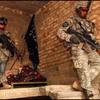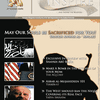John Hockenberry appears in the following:
Pulling Back a Curtain on North Korea with the Story of a Banana
Wednesday, August 04, 2010


I suppose she could have told those kinds of stories. But it was what she said about a simple banana that blew me away.
Amid Positive New from the Gulf, Questioning our Reliance on Oil
Wednesday, August 04, 2010


"It doesn’t really matter what you do with the BP oil,” said environmental activist, journalist and writer Bill McKibben. He said as much to us when we talked to him right as the scale of the BP oil gusher was becoming clear. McKibben’s point was to compare the difference between the effect of just allowing the BP oil to bleed into the gulf unchecked to just burning it as would have happened in cars and power plants if there had been no leak and the oil just joined the huge river of carbon fuel consumption.
The Silver Lining: When Disaster Helps Political Fortunes
Monday, August 02, 2010


All it took was the threat of oil hitting the white beaches of Florida to reignite the political fortunes of Gov. Charlie Crist. Once counted out in the polls and basically chased out of his own party, the now independent Crist is the frontrunner.
What Happened in Iraq 2 Decades Ago Still Resonates Now
Monday, August 02, 2010


20 years ago, history began. Saddam Hussein’s wrong bet on the West – when he invaded Kuwait and assumed the rest of the world would shrug – set everything in motion that we still see unfolding today. The Cold War narrative of European history was ending. The Cold War was the last act of an unraveling of the Napoleonic demons of European History. Saddam’s invasion of Kuwait was the inauguration of a different narrative.
Technology and Conflict Zones
Wednesday, July 28, 2010


The American obsession with technology is often described as driving the U.S. economy. Certainly the tech boom of the 1990’s rippled across the economy until the bubble burst in 2000. By 2010 technology gadgets have acquired the allure of fashion objects. The high mark-up of high tech devices like cell phones and laptops, desktop computers, iPads and other baubles has come with considerable outsourcing of assembly jobs to lower wage manufacturing centers in Mexico, China, Taiwan and other locations. The fashion-ization of tech culture has also come with the sourcing of raw materials in conflict zones like Congo.
Laughing at Disability: Remembering Cartoonist John Callahan
Wednesday, July 28, 2010


In the same week we celebrated the 20th year anniversary of the Americans With Disabilities Act I learned that writer and cartoonist John Callahan passed away. He was a cartoonist who said what other wouldn’t about the experience of disability. His cartoons were hysterically funny. His book “Don’t Worry He Won’t Get Far On Foot,” was both a caption to a drawing that everyone who uses a wheelchair has seen, and a collection of daring explorations of myths and stereotypes. Callahan probably had as much to do with the empowerment of people with disabilities with his universally funny work as the ADA itself.
Twenty Years of The Americans with Disabilities Act
Monday, July 26, 2010
President George H. W. Bush signed the Americans with Disabilities Act into law 20 years ago, today. Since then, we’ve almost come to take for granted many of the things it required: accessible public transportation, reserved parking, more frequent curb cuts, equal access to employment and education opportunities, and much more.
John Hockenberry on Twenty Years of the Americans with Disabilities Act
Monday, July 26, 2010


I think it odd that I am actually seriously celebrating and thinking about the 20th anniversary of the Americans With Disabilities act. As a man who has spent well over half of his life in a wheelchair with a permanent spinal cord injury I can say that my feelings about this landmark law have generally been negative.
War in Iraq: Considering the Drawdown
Thursday, July 15, 2010


Today the U.S. hands over a prison in Iraq and it’s barely worth a headline. The time that has passed since the U.S. invaded Iraq has created some scars and healed others. I’m struck by how much this milestone conveys the mystery of what the Iraq war has meant to the U.S. What is its legacy to a generation of young people, policymakers, and citizens? Is Iraq a failure, a success, or something different altogether?
Haiti: Geologic Time vs. The News Cycle
Monday, July 12, 2010


Geological events mark their evidence in rock and the position of the earth’s crust. The earthquake becomes a part of the geological identity of a place. Geology is its own narrative and it unfolds very slowly… literally in geological time for the estimated million people still waiting for help. We have a built-in sense that people bounce back from disasters. But perhaps to even look at Haiti six months after as though it is a long time is absurd. It says more about our attention span than it says about Haiti itself. Just as the presence of President Obama on the beaches of Alabama is more likely to produce a headline than the presence of oil that same beach would, it’s our attention span that is the story.
The “headline-breaking-news all-urgency-all-the-time” model of news coverage makes it very difficult to establish the narrative line to give a complex story like Haiti’s aftermath the day-to-day focus it needs. Each tree ring tells a story in the long-term record of life on earth.
Pentagon Policy Threatens Fragile Agreement with Journalists
Friday, July 09, 2010


John Burns of The New York Times set up a very disturbing notion of media dynamics in the wake of the Rolling Stone demise of Gen. Stanley McChrystal. Clearly Burns believes that McChrystal was a real asset in the Afghan military campaign and is being sacrificed because of the Michael Hastings story in Rolling Stone. Burns seems to think that Hastings took nuanced moments to create a portrait of military commanders contemptuous of their civilian colleagues. The piece challenged the principle of civilian control of the U.S. Military. Burns believes the piece may have ended a longstanding relationship between journalists and military leaders as a channel for much needed information over time. By taking what Burns seemed to suggest were “off-the-record” moments and using them to support the Rolling Stone “Runaway General” premise, Hastings has made it difficult for reporters to get the real story of what is going on in Afghanistan and Iraq or at the Pentagon generally, from here on out.
On Texting 9-1-1
Tuesday, July 06, 2010


New Hampshire is thinking about upgrading its 911 system to include other digital data. Under the new system, you wouldn’t simply call 911 — you would upload to 911.gov or something like that. You could transmit pictures of your deployed airbag from your very own traffic accident. You could send text messages. Instead of LOL it could be BAO (burning all over) or BOB (burning out back).
Unemployed? You Should Get a Bonus
Tuesday, July 06, 2010


You hear the debate in the U.S. Senate: aid money is wasted money. Giving people or nations money in the form of unemployment benefits or aid is a disincentive to change. Pay unemployed people and they stay unemployed. Pay poor people and they stay poor. Give aid to corrupt governments and those governments stay corrupt.
Is Osama Bin Laden the Miley Cyrus of Terrorism?
Friday, July 02, 2010


Al-Qaida starts a magazine, gives it the catchy title, “Inspire” and gets a ton of free publicity. I got that message this morning and also another one of frustration and annoyance from two guests we asked to come on the show and talk about this bizarre new magazine. Yet while the media is focused intently on analyzing what this move says about the inner workings and aspirations of al-Qaida, it becomes much harder for a legitimate magazine like Alo, a lifestyle magazine for Muslim Americans, to get any attention.
They Think, Therefore I Am
Thursday, July 01, 2010


Brendan Koerner, a writer for Wired Magazine, had a thoughtful thing to say this morning about what happens in the brain to people who use the techniques advocated by Alcoholics Anonymous to deal with their addictions. The organization is 75 years old and its success in treating alcohol abusers is notable and of significant interest to neurologists. Koerner says that one of the most powerful aspects of AA’s treatment is the replacement of the damaged brain of an addict with, in a sense, a substitute pre-frontal cortex consisting of other people. The group dynamics of AA constitute a substitute decision-mechanism capable of resisting temptation, something the addict brain cannot do very well. Are other people a kind of neurological “prosthetic,” an outboard brain to enhance or even diminish the abilities of our given brain?
What did writer/philosopher John Paul Sartre say about hell? “Hell is other people.” Maybe it should be edited to read: “My brain is other people.” Or Rene Descartes might say “They think, therefore I am.”
Elena Kagan: Where Were You on Christmas?
Wednesday, June 30, 2010


Contact Moscow and Wait for Instruction
Tuesday, June 29, 2010


"They landscaped, they, they, just did nice family stuff. That's all I know. So we're just all completely shocked."
That’s a quote from one of the neighbors commenting on the arrests of at least ten people for trying to infiltrate U.S. society in some way at the behest of the Russians. The ten were charged with “failing to register as Foreign agents.” So I’m trying to imagine the Kremlin meeting of the Russian spymasters as Putin's deputies delivered the marching orders: (bad grammar added below for special Russian flavor)
"You will go to American suburb communities to blend into cultural fabric using special blending skills like being students, and doing landscaping, also watching television vignettes of 'Sex in City' and 'Dr. Phil.' You will receive instruction on how to perform “nice family stuff” such as eating Jell-o and coloring eggs for small Easter celebrations also grilling and cleaning out of garages on weekend afternoons. This will conceal you within American culture with sophisticated camouflaging effect. Finally, you will move toward centers of power by trimming lawns of Senators and other power elites, also child care for important opinion makers. When you have acquired influence contact Moscow and wait for instruction. One more thing: At NO point should you pay attention to man named Rod Blagojevich. He is part of independent undercover operation. Having problems. That is all."
In Hearings, Why the Different Standards for Kagan and Petraeus?
Tuesday, June 29, 2010


So a female legal scholar and Ivy League dean faces the Senate Judiciary Committee today, while a male military scholar and Ivy League PhD faces the Senate Armed Services Committee. The tone of the two hearings will be very different for some obvious reasons.
Petraeus is beloved of both parties and has already commanded U.S. forces in Afghanistan. His confirmation is a foregone conclusion. On the other hand, it’s not going to be easy for Elena Kagan, whose confirmation is hers to lose based on her support among majority Democrats. The irony is that Petraeus’s Ivy League credentials, coupled with his military experience, are likely to be intimidating to questioning Senators, while the fact that Kagan was the dean of the Harvard Law School is going to be an opening for questioning her lack of experience as a judge.
Most of the Senators are lawyers, so maybe that is the entre to be tough on Kagan. Petraeus’s academic degrees, however, are in international relations and public administration, which are hardly obscure subjects for opinionated Senators. Yet, while Petraeus’s credentials seem to be a restraining force on the Senators of the Armed Services Committee, it’s more of an “open season” on Kagan over the Judiciary.
We’ve seen a rise of the scholar-general in the Pentagon. It’s a good thing to enlarge the expertise of military leaders, but does it elevate them to an untouchable priesthood? In the Civil War, Abraham Lincoln — the self made scholar — became a self-made military tactician because he wanted to be able to second guess the frustrating military leadership of the Union Army. Despite his lack of experience, Lincoln's oversight led to the Union victory, while disastrous decisions by generals like MacClellan, Hooker and Burnside aided Confederate forces. If generals with PhDs intimidate civilian political leaders, what quality of oversight can we expect in the Afghanistan War? If Lincoln wasn’t intimidated by his generals, then Obama and the Senate shouldn’t be either. And why should it be any different for Supreme Court nominees?
The Many Jobs of the Late Robert Byrd
Monday, June 28, 2010


The Voices of Soldiers Heading to Afghanistan
Monday, June 28, 2010
Last week in Afghanistan it was the changing of the guard for some Generals, McCrystal sent packing, General Petraeus packing for a return visit. But all across America every day, families are packing up and sending a loved one off to join the troop surge in Afghanistan. John Hockenberry hears some of the voices from the First Battalion, 87th Infantry of the 10th Mountain Division.


















